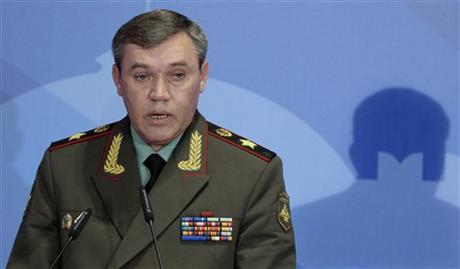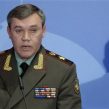
General Gerasimov Downplays Nuclear Cuts
Publication: Eurasia Daily Monitor Volume: 10 Issue: 100
By:

A conference on European security, organized by the Russian defense ministry on May 23–24 in Moscow, served as a platform for the top brass to reiterate well-worn themes and perspectives on a range of issues: from the United States’ ballistic missile defense (BMD) system to revamping the existing security structure in Europe. Alongside senior Russian defense officials and experts were a selection of counterparts from the US and Europe who discussed strategic issues linked to European and, indeed, global security. However, the set of interlinked views expressed during the conference—and representative of the ideas and policy stance among Russia’s defense leadership—displayed no tangible advance on similar statements in recent years. This is particularly clear with reference to the address by Army-General Valery Gerasimov, the chief of the General Staff and first deputy defense minister (Interfax, May 24).
Gerasimov’s sobering remarks served to illustrate how divided on key security issues Russia remains from any Euro-Atlantic position. These issues are already known among policymakers trying to find ways to bridge the gaps and promote meaningful dialogue with Moscow: opposition to missile defense in Europe, suspicion about advances in Western conventional capabilities, calls for a new European security architecture, concern over the future strategic balance in Europe, reticence to further reduce nuclear stockpiles, advocating a replacement for the Conventional Armed Forces in Europe (CFE) Treaty and expanding the nuclear arms control regimes to include other members of the “nuclear club” (Russian defense ministry website, accessed May 27).
While there is little to distinguish the views expressed by Gerasimov from his predecessor, General Nikolai Makarov, if anything, some of his comments mark a toughening of the Russian position. In pole position among the favorite themes pursued by Russian defense officials are the missile defense plans of the United States and the North Atlantic Treaty Organization (NATO). Despite efforts by the Barack Obama administration to placate Moscow’s objections and anxieties concerning missile defense, Gerasimov repeated the same old threat to take “asymmetrical” and “military-technical” steps to counter the BMD shield if it is perceived to threaten Russia’s strategic nuclear deterrent. “A set of military-technical measures aimed at neutralizing the possible negative influence of the global US missile defense system on the potential of the Russian nuclear forces has been developed and we are not hiding it,” Gerasimov told the conference, adding, “Its implementation will depend on our own assessment of the capabilities of the US and NATO missile defense systems to weaken the potential of the Russian strategic nuclear forces” (Interfax, May 24).
The threat to adopt military measures against the North Atlantic Alliance in response to missile defense is by no means new, and at no stage have these measures been detailed in any clear manner. But Gerasimov appeared to signal that Moscow has already successfully prepared for this contingency and its implementation awaits a future assessment that the West’s BMD shield has passed the Rubicon and poses a threat to Russia’s nuclear deterrence. In response to a question about whether the missile defense issue was moving toward escalation or collaboration, Gerasimov said: “The situation with missile defense remains a serious military and political problem. Despite some changes in our partners’ plans, we cannot be quite sure that the US missile defense system does not have anti-Russian potential.” Gerasimov used the same framework to argue against missile defense that has surfaced and resurfaced in the past few years, but provided no evidence that it poses any real threat to Russian security (Interfax, May 24).
Linked to this theme, Gerasimov again advocated a new document on conventional arms control in Europe, to replace the CFE Treaty, which must not only affirm indivisible security principles but also include new types of arms acquired by European armies. “There is the most complex situation around the CFE Treaty, which is an illustrative example of mistrust of the epoch of confrontation between blocs,” he explained before arguing that Moscow was forced to declare a moratorium on its CFE Treaty commitments in December 2007. “We also realized the need for developing completely new Euro-Atlantic security principles on equal non-bloc terms targeting collective efforts in the provision of regional peace,” General Gerasimov noted. The future regime of control over conventional arms in Europe should provide “equal and indivisible security in Europe and balance rights and commitments of the sides,” he argued, adding, “Some of these principles are declared in the Vienna document of 2011. However, mechanisms of the Vienna document must be adjusted to transformations in the armies of many European states” (Interfax, May 24).
Gerasimov dampened speculation that Moscow might be ready for fresh nuclear arms cuts, and repeated earlier statement by his predecessor among other Russian defense officials calling for the abandonment of nuclear arms control on an exclusively bilateral basis “The processes of limitation and reduction of nuclear armaments cannot be bilateral forever. The commitment of other ‘nuclear club’ members not to build up their nuclear arsenals becomes topical under modern conditions,” The Russian Army-General declared to the conference. He said, however, that Moscow welcomes unilateral steps by the United Kingdom and France to limit their nuclear arms (Interfax, May 23).
Part of Moscow’s vision for a replacement CFE Treaty is to address its concerns about the growing role of high-precision weapons, and in particular its opposition to US global prompt strike plans. Gerasimov explained to his audience the perspective among the top brass that new high-precision weapons are comparable with nuclear arms in terms of their efficiency. “Some formally non-strategic weaponry has an influence on the balance of forces and a strategic mission. The influence of these systems on the balance of forces will grow alongside the reduction of strategic nuclear armaments,” Gerasimov asserted, noting that such weapons “are not subject to quantity, quality or territorial limitations, [but] may be used in attacks on strategic sites.” He stated that additional steps toward nuclear arms reductions must take into account these circumstances (Interfax, May 23).
While promising that the conference discussions will be carefully examined, Gerasimov made clear that Moscow’s position on a range of issues depends on the willingness of the United States to back down and offer Russia a new and revamped role in the Euro-Atlantic security system. His comments differ little in substance from those of his predecessors. And six months after his appointment, Gerasimov stands out only as a figure more able to tread well-trodden paths than one willing to reform existing structures or develop new approaches to old problems.




